 Cd’D ADR offers a full range of conflict resolution services:
Cd’D ADR offers a full range of conflict resolution services:
Mediation
Mediation is an informal process in which a neutral third-party (the mediator) assists parties in conflict to identify issues and to resolve them. The conflict can either be a dispute the parties are in, such as a pending or impending law suit, or a deal that the parties want to put together. In either case, the mediator will meet with the parties individually or as a group, depending on the nature of the relationships among the parties, and their wishes as to the approach to be used. Sometimes both joint and individual sessions are held at various times throughout the mediation. The parties will continue to meet in mediation until they either reach agreement or impasse, or until one or more of the parties elects to terminate the mediation for other reasons. The length of the mediation can be as short as an hour or may take several days. The mediator’s role is to provide an environment in which the parties and their attorneys feel at ease; to suggest ground rules to promote civility; to aid the parties in communicating with one another; to promote an efficient exchange of information necessary to resolve the conflict; to provide information regarding the appropriate negotiation strategy to use, given the nature of the conflict and the relationships of the parties; to help the parties to identify issues and to set an agenda for their discussions; to encourage the parties to generate and examine options for resolution; and to help the parties to appropriately memorialize the terms of any resolution they reach. The mediator is not authorized to make any decisions on the merits of the conflict, and must (with rare exceptions) keep confidential what was said and done by the parties during the mediation.
Arbitration
Arbitration is a private dispute resolution process, in which a neutral (the arbitrator) is authorized by the parties to decide on the resolution of the parties’ dispute after giving them an opportunity to present evidence and argument. The arbitration process is conducted according to procedural rules agreed to by the parties, such as the rules provided by the American Arbitration Association. The arbitrator acts as a private judge, one who is selected and compensated by the parties rather than the state or federal government. The arbitrator’s decision can be binding or non-binding, depending on the parties’ choice. Arbitration decisions (“awards”) may be confirmed and then enforced in court, if necessary. The arbitrator’s decision is not usually subject to appeal.
Litigation evaluation
Idaho’s Small Lawsuit Resolution Act (“SLRA”, Title 7, Chapter 15, Idaho Code) created a process called “litigation evaluation” to resolve civil actions exclusively for money damages of $25,000 or less. It is a hybrid process which may go down a mediation track or an “evaluation” track that resembles non-binding arbitration. After one of the parties invokes the SLRA, the parties can agree whether to mediate or to have an evaluator conduct an informal trial called an “evaluation hearing”. Occasionally, parties will ask the evaluator to attempt mediation before conducting the evaluation hearing, though this blended approach is not expressly provided for by the SLRA (nor is it forbidden either, however). The evaluation hearing is conducted under relaxed rules of evidence and procedure. The evaluator issues a decision after the hearing, ruling which party prevailed and the amount of damages, if any. Either party may request a trial de novo by a jury or the court following the evaluator’s decision, but if the party requesting the trial de novo does not win a verdict that is at least 15%.better than the evaluator’s decision, then that party may be required to pay the other party’s costs and attorney fees. SLRA evaluation fees are capped at $1,000.00.
Meeting facilitation
Sometimes business partners, members of associations, government agencies, and other stake-holders elect to bring in an outside facilitator to run a meeting in as non-contentious and efficient manner as possible. The process can be especially helpful for strategic planning, for rule-making public hearings, or to address controversial public issues. The facilitator’s role is to conduct the meeting in a civil manner, allowing as many people who care to speak to have their say, and to focus the discussion in a constructinve, results-oriented direction.
Fact-finding
Fact-finding is a process most offered utilized in collective bargaining. For example, a union and the employer might disagree over basic underlying economic facts which bear on the issues over which they are bargaining. They may agree to submit such factual issues for determination by a neutral, or a panel of neutrals. Such a process is expressly authorized (and in fact required in certain circumstances) by Sec. 44-1805 et seq., Idaho Code. Under this model, the employee’s bargaining agent usually designates one member of the fact-finding commission, the employer another, and those two select a third, who serves as chair. In the event the two members are unable to agree on the third “neutral” fact-finder, then the Director of the Idaho Department of Labor appoints the chair from a roster maintained for that purpose.
